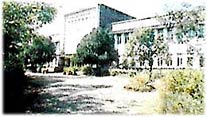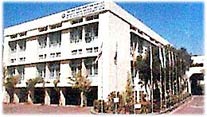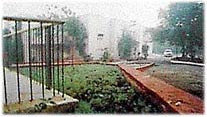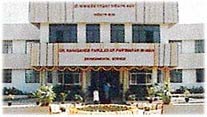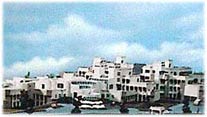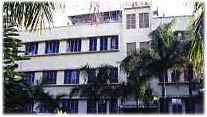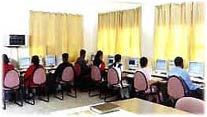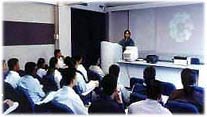|
| 뿌네 대학교 | |||||||||||||||||||||||||||||||||||||||||
| These words
of Jawaharlal Nehru embody in them the guiding principle of Pune
University. Established in 1948, the University has since become
one of the leading centres for research and teaching in the country.
The 400 acre campus is located in the North Western part of Pune. The placid environs and state of the art facilities provide it's numerous students with an ideal atmosphere to pursue research in various areas of Science, Arts, Commerce and Languages. The University houses 40 departments which provide a wide array of academic programs. Though a young centre, the University has made a significant impact in various areas of research and teaching, and continues to strive for excellence. |
|||||||||||||||||||||||||||||||||||||||||
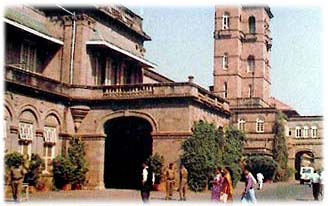 |
|||||||||||||||||||||||||||||||||||||||||
|
The University of Pune ( formerly known as University of Poona
) was established under the Poona University Act, passed by the
Bombay Legislature on 10th February, 1948. In the same year, Dr.
M. R. Jayakar assumed office as the first vice chancellor of the
University. Initially the University had a jurisdiction extending over 12 districts of Western Maharashtra. However, with the establishment of the Shivaji University, Kolhapur, in 1964, the jurisdiction of the University was restricted to 5 districts, namely Pune, Ahmednagar, Nasik, Dhule and Jalgaon. Out of these, two districts - Dhule and Jalgaon are attached to the North Maharashtra University established in August 1990. During the year 1949, there were only 18 colleges affiliated to the University, with an enrollment of over 8000 students. Thereafter, the number of colleges increased, and in 1994-95, the University had 41 post-graduate departments, 209 affiliated colleges and 118 recognized research institutions, with an enrollment of 1,70,000 students for both the under-graduate and post-graduate courses in different faculties. 70research institutions have been recognized by the University for research. These include institutions of national importance like the National Chemical Laboratory (NCL), MACS, CWPRS, NIV, Gokhale Institute of Politics and Economics, Deccan College among others. Since its inception, the progress of the University of Pune
has been inextricably linked with the efforts of an illustrious
list of Vice-Chancellors.
ARTS 1. Centre for Advanced Study in Sanskrit 2. Centre for European Studies 3. Centre for Performing Arts 4. English 5. Foreign Languages 6. Geography 7. Hindi 8. Marathi 9. Sanskrit and Prakrit Languages Science 1. Biotechnology 2. Bioinformatics 3. Botany 4. Centre for Interdisciplinary Studies (Science) 5. Chemistry 6. Communication Studies 7. Computer Science 8. Electronic Science 9. Environmental Science 10. Geography 11. Geology 12. Instrumentation (USIC) 13. Institute of Bioinformatics and Biotechnology 14. Interdisciplinary School of Health Sciences 15. Interdisciplinary School of Scientific Computing 16. Mathematics 17. Microbiology 18. Physics 18. School of Energy Studies 19. Space Science 20. Statistics 20. Zoology Mental Moral and Social Science 1. Anthropology 2. Centre for Interdisciplinary Studies (Humanities & Social Science) 3. Communication & Journalism 4. Economics 5. History 6. Philosophy 7. Politics & Public Administration 8. Psychology 9. Sociology 10. Library & Information Science 11. Defence & Strategic Studies Commerce & Management 1. Commerce & Management Science Law 1. Law Non-teaching Departments 1. Academic Staff College 2. Adult & Continuing Education 3. Board of Sports 4. Centre for Network Computing 5. DRDO/ISRO Cells 6. Education & Extension 7. International Centre 8. Science and Technology Park
Registration and Admission of External Candidates to the Pune University Courses A large number of aspiring students cannot undertake regular courses in the Colleges or in the Pune University Departments either due to lack of financial resources or non-availability of time to attend full-time courses or because they stay at remote places far away from the colleges. Some of them are either employed or housewives or even senior citizens unable to join regular courses. Pune University for last several decades is facilitating such students through its External Registration Program which allows them to register for certain courses, undertake self-study of the stipulated syllabi and directly appear for the examinations leading to graduate or post-graduate degrees in certain faculties. Under this program, Pune University awards graduate degrees such as B.A. and B.Com. and Post-Graduate Degrees such as M.A., M.Com, M.Sc. (Maths), M.A. (Maths), L.L.M. and Class Improvement of certain examinations. This facility is being availed by about 50,000 students annually. Problems of the Current Process: So far the registration and admission process was carried out in a traditional manner with paper and print medium and communications through postal service. In many cases aspiring candidates had to undertake the journey to Pune and visit the University Campus or face the postal delays and occasionally also suffer from the loss of documents in transit. All this was causing a lot of undesirable time and cost burden to them in addition to anxiety and inconvenience. In many cases the information and rules and regulations printed on the forms and prospectus could not be clearly interpreted by the candidates especially in understanding the eligibility and ATKT criteria, required documents to be attached to the forms, choice of subjects permitted as per the University rules, fee structure, due dates, examination formalities, etc. The printed information was too general and at times rather too comprehensive than what was specifically applicable to particular candidate in his specific context. Instead of reading this huge amount of general information the candidate needed personalized help to finish his registration. All this needed face-to-face interactions of a large number of candidates with a limited administrative staff of the External Section of the Pune University. This led to severe delays and inconveniences to the candidates apart from an inadvertent load on the administration. In order to facilitate the candidates, Pune University distributed the same process and made the services available at 9 colleges last year. However, the limitations of the traditional system prevailed and the relief to the candidates could not be ensured at the desired level. New Internet based Process: After a careful analysis of the present system and the experience of last year, it was decided to completely reengineer the traditional process in the overall interest of the candidates by exploiting the advances in web technology. Main objective is to facilitate the candidates by cutting down their costs and avoiding delays and inconvenience. Pune University has entrusted the task of design, development and deployment of this system to the Maharashtra Knowledge Corporation Limited (MKCL). The entire process of application for registration and admission of the External Candidates shall be brought on a website on Internet so that candidates can now apply from anywhere and any time. The details of the website shall be published in June 2003 in the admission notification in the press by the Pune University. The application form can be filled in either from any cyber caf?or any home computer connected to Internet. The candidates do not have to undertake journey to Pune or physically come to interact with the administrative staff of the University. The information in the form shall be requested in English and Marathi and entries are to be made in English. Mass Personalization: The website specially designed for this purpose contains all the information and rules about the courses including the syllabus, eligibility conditions, fee structure, due dates, etc. However, the software hosted on this website for filling in the Application Form on Internet has been so designed that the candidate is presented with a step-by-step and guided process to fill in the form. The next piece of information requested from him is based on online processing of his previous entries and interpretation and applicability of various rules to his specific case. Thus, the candidate gets a feel that the Application Form is, as if, specially designed for him or personalized for him. As this is simultaneously applicable to a large number of candidates, the application process gets transformed from a generalized faceless process to a mass personalized service suited to the real need felt by the candidates. It is in this way a transition is being made by the External Section from a role of education administrator to a new role of education facilitator. Call Center Facility: In addition to this, the candidates shall also be facilitated through a Call Center on a round the clock (24*7) basis. They can call the facilitator over an ordinary telephone line in Marathi or Hindi or English and get their difficulties solved so that the registration and admission process can be completed smoothly. Student Facilitation Centers: MKCL is also setting up Student Facilitation Centers in the tehsils of the Pune, Nasik and Ahmednagar districts and at all other district headquarters. Candidates can get the counseling, personalized help-desk, computer operator assistance and Internet facility at reasonable rate at these centers so that they will not face any difficulty in the electronic form filling process. Post-application value-added Services: The candidates can always check the status of their cases or revise the information directly on the website and also instantly receive by email (in addition to printed communication by post) the acknowledgement of form, certificates and documents sent by post, demand draft of fee and photograph, eligibility status, discrepancy report (if any), examination schedule, notices and reminders, status checks on SMS, printed Registration Card etc.
웹싸이트 주소 : http://www.unipune.ernet.in |
|||||||||||||||||||||||||||||||||||||||||
|
|
